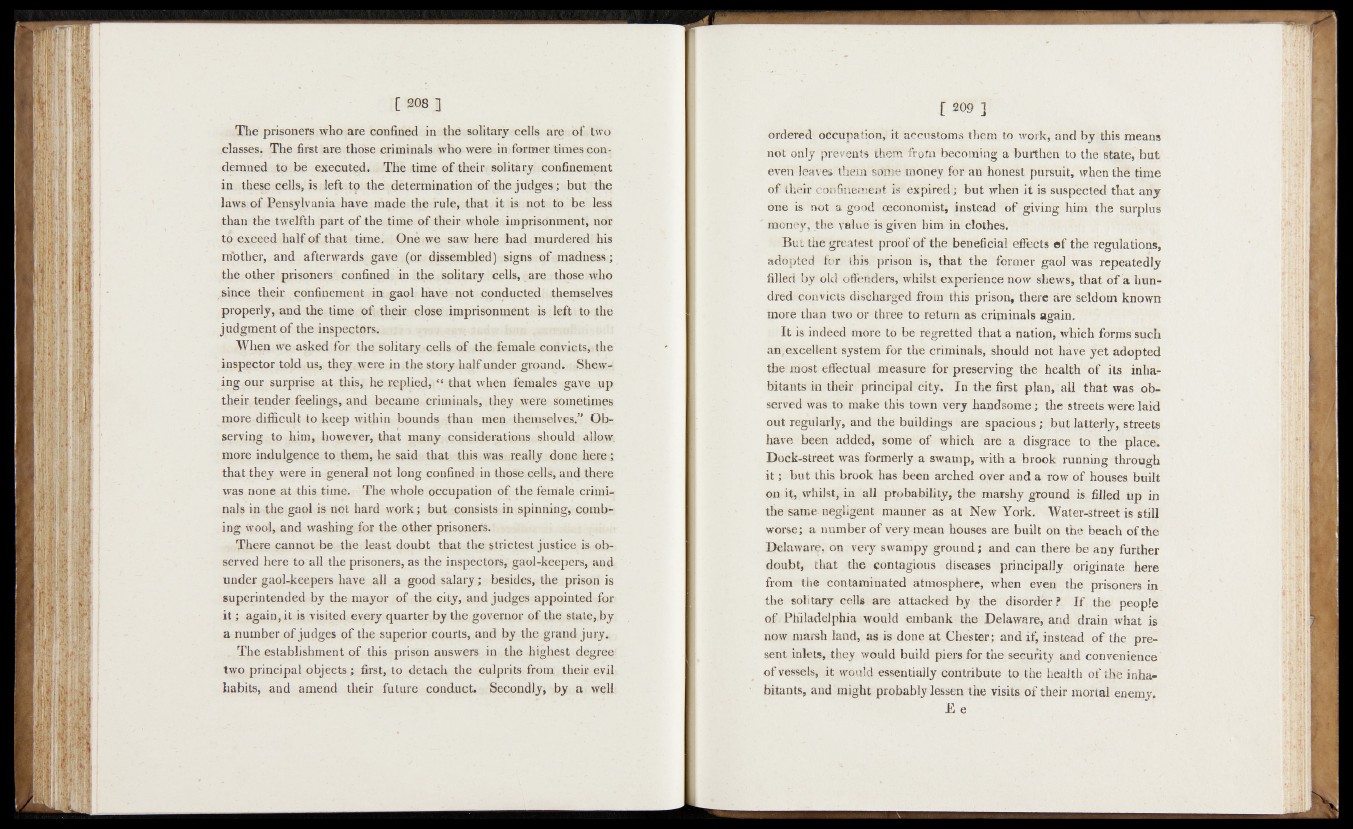
The prisoners who are confined in the solitary cells are of two
classes. The first are those criminals wlK^we^ ihifornaerilimeseon^
demned to be executed. The time of their? solitary confinement
in these cells» is y left, »to the determination of the j udges; i but ‘the
laws, of Pensylvania have made,the rule, that it is not to be less
than the twelfth part of the time of their whole imprisonment, nor
to exceed half of that time. One we saw here had murder ednhis
mbther, and afterwards gave >(or dissembled), signs of madness.;
the other prisoners-, confined in the solitary cells, are those-who
since their confinement in gaol have not conducted ; themselves
properly, and the time of; their close imprisonment ds left to |h e
judgment of the inspectors.
When we asked for the Solitary, cells of thefemale convicts,, the
inspector told us, they were in ,the story half under ground.»jgShew-.
ing.our surprise at this, he replied, “ that when females gave up
their tender feelings, and became criminals,, they' were Sometimes
more difficult tokeep within bpunds than men themselves,’’ Observing
to hiin,; however, that many , considerations «should allow,
more indulgence to .them, he said that this was■.really done here;
that.they were in general not long confined in thosejqell^anÉthere;
was none at this time. The whole occupation of the female:*criminal?
in the.gaol is not hard work; but consists in spinning,-combing
wool, and washing: for the. other prisoners.
There cannot be the least doubt that the strictest justice- is. observed
here to-all the prisoners, as the inspectors, gaol-keepers, and
under gaol-keepers have all a good salary; besides, the prison is
superintended by the mayor of the city, and judges appointed for
i t ; again, i t is visited every quarter by the governor of the state,by
a number of judges of the superior courts, and by the grand jury.,
. The establishment of this prison answers iq; the highest degree'
two principal objects; first, to detach the culprits from thei-r evil
habits, and amend their future conduct. Secondly, by a well
[ m ]
ordered occupation, it 'accitstomsrthem to work, and by this means
not only prevents therfi ffom%ecbminga burthen to the state, but
even* leaves them sdme money for an honest pursuit, when thé time
of thëi^eonfinement is lexpired;; but when it is suspected that any
one isr not a good : economist, instead of giving him the surplus
money, the value is given him in clothes.
But the greatest proof of the: beneficial effects of the regulations,
adopted for this prison is, that the former gaol was repeatedly
filled, by old offenders, whilst experience now shews; that of a hundred
monvicts discharged from this prison, there are seldom known
moré than tswo or three tó^rétUrn as criminals again.
It is indeed more to be regretted that a nation, which forms such
an, excellent system for the criminals, should not have yet adopted
the most effectual .measure for preserving the health of its inhabitants
in their principal’ city. In the first plan, all that was observed
was td> make this town very handsomer the streets were laid
out regularly, and the buildings are spacious; but latlpjriy?i streets
have been added, some of which are a disgrace to. the places
Dock-street was formerly a swamp, with a brook running through
it ;v but this brook has been arched over and a row of. houses built
on it, whilst,, in all probability, the; marshy ground is filled up in
the same negligent manner as at New York. Water-street is still
worse; a number of very mean houses are built on the beach of the
Delaware, on very swampy ground; and can there, be any further
doubt, that the contagious diseases principally originate here
from the contaminated atmosphere, when even the prisoners in
the solitary cells are attacked by the disorder ? If the- people
of4 Philadelphia would embank the Delaware,; and drain what is
now marsh land, as is done at Chester; and if, instead pf the prèS
sent inlets, they would build piers for the security and convenience
of vessels, it would essentially contribute to the health of the inhabitants,
and might probably lessen the visits of their mortal enemy,
I E e I